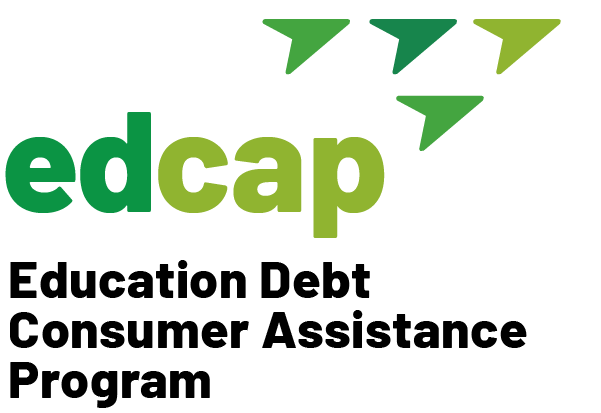Get Guidance Based on Your Situation
What best describes your private loan situation?
My loans are in good standing.
Are you struggling to pay them short-term or long-term?
- I am struggling to pay short-term: Speak with your lender. Explore temporary payment pause or reduction options with your lender, like a forbearance or interest only payments.
- I am struggling to pay long-term and feel I will default: Explore refinancing. Refinancing may help reduce your interest rate and/or give you’re a longer repayment term. It will require creditworthiness and ability to qualify for a new loan.
My loans are in default.
- Understand the consequences of default: Your debt will likely be sent to a debt collector and you, and any co-signer risk being sued.
- Explore a settlement: Once you have defaulted, a lender or debt collector is more likely to offer you a settlement option. Get help before resuming payments or settling the debt.
- Do not ignore your correspondence: If your loans are delinquent or in default, read your correspondence. Do not ignore it. You want to get help, especially in the event you are sued. You may have a defense or be able to settle the debt. Seek legal advice!
- Beware of the Statute of Limitations: The Statute of Limitations for defaulted private loans varies by state (typically 3-10 years) and determines the period during which a lender can legally sue you for repayment. After it expires, while the debt remains, the lender cannot take legal action against you. Check your state’s laws to know your rights.
I am or have a co-signer.
- Communicate with the Borrower: Open a dialogue with the primary borrower to understand their financial situation and explore possible solutions together. Encourage them to contact their lender to discuss hardship options, deferment, or other options.
- Monitor the Loan Status: Regularly check the loan account to stay informed about payment statuses and any missed payments. Many lenders allow co-signers to access the loan information online. Staying proactive can help you address issues before they escalate.
- Consider Refinancing or Co-signer Release: Explore the possibility of refinancing the loan to secure a lower interest rate or more manageable repayment terms. Some lenders offer a co-signer release option after a certain number of on-time payments, which can remove you from the loan obligation. Discuss these options with the primary borrower and lender to determine the best course of action.
- Learn more about your rights and responsibilities as a co-signer.
Private Student Loan FAQs
Unlike federal student loans, private loans offer fewer repayment options and consumer protections. Here, we address common questions to help you navigate your private student loan journey.
Private Student Loan Basics
How do I know if I have a private student loan?
There is no database you can access to determine if you have a private student loan. But here are some indicators that your loan is private:
- The interest rate is high or variable. Interest rates for private loans can be 10% or higher. Federal student loan interest rates generally range from just under 3.0% to about 9.0%.
- You had a co-signer. Private loans will usually require a co-signer.
- Your loan does not appear on the Federal Student Aid Dashboard when logging into an FSA account on studentaid.gov. Only federal loans are on this system. If the loan at issue is not here, it is probably a private loan.
What are the risks of using private loans for education costs?
Understanding the risks can help you make an informed decision:
- Higher Interest Rates: Private loans often come with higher interest rates compared to federal loans, increasing the overall cost of borrowing.
- Less Flexibility: Private loans offer fewer repayment options and protections. Repayment terms are typically fixed, based on your loan balance, interest rate, and a predetermined repayment period.
- Credit-Based Approval: Approval for private loans depends on your credit score and income. If you don’t qualify on your own, a co-signer will be required, and your credit score will affect the interest rate offered.
What fees should I be aware of with private student loans?
Understanding the potential fees can prevent surprises:
- Origination Fees: Some lenders charge a fee for processing the loan.
- Late Fees: Missing a payment deadline can incur late fees.
- Prepayment Penalties: Most private student loans do not have prepayment penalties but check your loan documents to be aware of this or any other fee.
How can I improve my chances of being approved for a private student loan?
Improving your eligibility can help you secure a loan with better terms:
- Build Credit: Establish a good credit history and score.
- Stable Income: Demonstrate stable and sufficient income.
- Qualified Co-Signer: If necessary, find a co-signer with strong credit and income. Know that the co-signer will be liable for the loan in case you don’t pay.
Repayment and Management
What are my repayment options for private student loans?
- To understand your specific repayment options, review your loan account and documents. Generally, your monthly payment is determined by your loan balance, interest rate, and repayment term, which could range from 5 to 20 years or more.
- If your loan has a variable interest rate, your monthly payments may fluctuate over time. Additionally, if you have multiple loans with the same lender, you may make a single payment that is then allocated across each loan.
Can I reduce my monthly private loan payment?
- It will depend on your lender. Lenders may allow borrowers to pay less than their scheduled amount temporarily. Always assess your short- and long-term ability to repay.
- Can’t repay temporarily: If you are struggling to repay temporarily, speak with your loan servicer about a payment pause–like a forbearance–or payment reduction options, like interest-only payments.
- Can’t repay loan balance or long-term: Get advice! Understand the consequences of delinquency and default. But also understand the Statute of Limitations and implications of restarting it once you have opted to stop paying. The Statute of Limitations is the time a lender has to sue you to collect on the debt and it varies by state. Don’t forget to communicate with your co-signer to mitigate the impact on their credit and potential liability.
Caution: Keep accurate records and continue to check your private loan statements. Borrowers who get a reduced repayment option due to an economic or other hardship report having other issues, like having to submit proof of income on a regular basis or seeing their monthly payment go up unexpectedly.
How can I keep track of multiple private student loans?
Managing multiple loans requires organization:
- Loan Servicer Accounts: Maintain accounts with each of your loan servicers and regularly check your balances and payment schedules.
- Run a Credit Report: If you’ve lost track of your private loans, running a credit report may provide the information you need. You can run free credit reports weekly at AnnualCreditReport.com. Running your own credit report does not impact your credit score.
- Budgeting Tools: Use budgeting tools or apps to keep track of payments and due dates.
- Refinancing: Explore your refinancing options. Refinancing means taking out a new loan to pay off your current private loans. It may simplify your repayment process and potentially lower your interest rate.
Caution: Do not refinance your federal loans into private loans. If you do, you will lose all the benefits available to federal student loan borrowers. Rarely does it make sense to refinance a federal loan into or with a private loan. Seek advice before considering this option.
What should I do if I need help managing my private student loans?
Seeking assistance can provide guidance and support. Contact EDCAP. Depending on your situation we may also refer you to a legal aid partner organization.
Challenges and Relief Options
What should I do if I can’t make my private loan payments?
If you are struggling to make your payments:
- Contact Your Lender Immediately: Explain your situation and inquire about temporary hardship options.
- Explore Repayment Plans: Ask if there are alternative repayment plans that could lower your monthly payments.
- Consider Deferment or Forbearance: While not required, some private lenders offer these options.
- Refinancing: Before you default, explore your refinancing options to see if you can get a lower interest rate. Refinancing means taking out a new loan to pay off your current private loans. You will need good credit and employment earnings sufficient to support a new loan.
Tip: Make sure to understand your ability to repay long-term. Getting a temporary reprieve is critical to keeping your private loans in good standing. But get help if you think you can’t pay long-term.
What happens if I default on my private student loan?
Defaulting on a private student loan can have serious consequences:
- Credit Score Impact: Defaulting will negatively affect your credit score.
- Collection Efforts: The lender may initiate collection efforts, which can include legal action.
- Co-Signer Responsibility: If you have a co-signer, they will be responsible for repaying the loan and their credit will be negatively impacted too.
Are private student loans eligible for forgiveness programs?
Generally, private student loans do not qualify for forgiveness programs:
- Limited Options: Unlike federal loans, private loans are not eligible for federal loan forgiveness programs.
- Employer Assistance: Some employers offer student loan repayment assistance as a benefit. Check with your employer for potential programs.
- Disability Discharge: Some lenders may provide relief for someone with a disability.
Can I discharge my private student loans in bankruptcy?
It is possible but difficult. Get legal advice if you are considering this option as it requires a different bankruptcy proceeding. To qualify for bankruptcy, you must show “undue hardship”, which generally means showing the following:
- You can’t maintain a minimal standard of living for yourself and your dependents based on your current income and expenses.
- Your financial situation isn’t likely to change during your loan’s term.
- You’ve made good faith efforts to repay the loan.
Tip: Unlike federal student loans, private loans have a statute of limitations. This means that if the statute of limitations has passed, the lender cannot sue you in court for the debt. If you don’t know the status of your private loans or have stopped paying them, get help before you take further action. Making a payment after you have been in default may start the statute of limitations.
Refinancing and Co-Signers
Should I refinance a private student loan?
Refinancing may be the best option to reduce your payment if you can get a lower interest rate.
- Get at least two-three different quotes from refinancing companies to make an informed decision. Factor in any loan origination costs.
- If you have a cosigner, refinancing may allow you to get rid of the co-signer as you are getting a new loan. However, be aware that you must qualify for that new loan. This means you must demonstrate you have income and have good credit.
Caution: Getting a private loan to pay off federal student loans is rarely a good decision. You will lose the benefits and protections that come with federal student loans. Get advice before taking any action.
How can I remove a co-signer from my private student loan?
Removing a co-signer can relieve them of responsibility:
- Refinance the Loan: If eligible, refinance the loan in your name alone.
- Co-signer Release: Some lenders offer a co-signer release after a certain number of on-time payments. Check with your lender for specific criteria. Usually you must show an ability to repay the entire loan and have a repayment track record.







